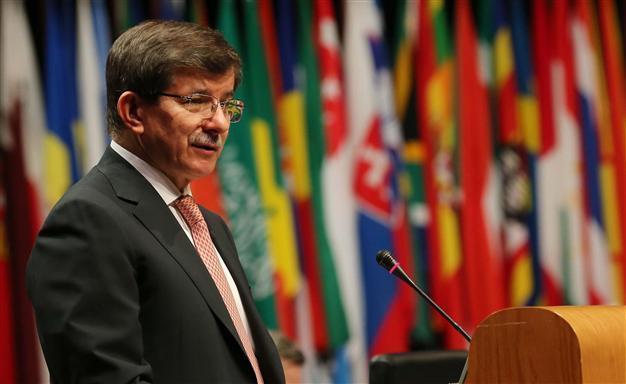The world according to Ahmet Davutoğlu

Turkish Foreign Minister Ahmet Davutoğlu. AA Photo
On Monday night, I flew to the Netherlands with Ahmet Davutoğlu, Turkey’s famous foreign minister. On the plane, there was him, some of his advisers, a few high-ranking diplomats, me and another journalist. Luckily, Davutoğlu had the time for a nice little chat.
First, I should note how busy the life of the Turkish foreign minister is. We were going to The Hague for an international summit on the prevention of nuclear proliferation and chemical weapons. In just 12 hours, though, he would continue to Kyrgyzstan for another summit. In the previous weeks, he had twice hosted John Kerry, America’s new secretary of state, along with other foreign ministers from Mali, South Sudan and the European Union. He had brokered peace between Somali and Somaliland, and was scheduled to talk at the Myanmar Contact Group of the Organization of Islamic Cooperation. Add to that several other meetings that I can’t even recall. On top of all this, however, there was the burning issue of Syria. I asked Davutoğlu how he thought the current nightmare could end. His bet was that the Bashar al-Assad regime would be forced to end its current strategy of carnage “thanks to changes on the ground and more pressure from the international community.”
“We do not want the destruction of the Syrian state. We do not want a whole overthrow of the existing cadre, like what happened in Iraq. Only those who are responsible for the crimes against the people should go. Then we hope to see a democratic Syria in which all ethnic and religious groups will be represented,” he said.
I asked him about the “extremists” within the Syrian opposition that the United States is extremely concerned about. He noted that Turkey has concerns about these groups as well. Yet, he argued, this could not be a reason to excuse the al-Assad regime or stay indifferent to the ongoing violence. Concerns about the post-al-Assad phase cannot be the main focus, when the current phase was the worst of all possibilities.
Then I asked Davutoğlu about the Democratic Union Party (PYD), the largest Kurdish faction in Syria, which is dubbed in Turkey as the “Syrian PKK,” because of the PYD’s affinity to the terrorist group in Turkey. It has long been speculated in Turkey that the PYD was close to the al-Assad regime, and therefore at odds with Ankara. But Davutoğlu said that “the positive atmosphere in Turkey seems to have had a reflection in Syria as well” and that his government notices that the PYD was engaged in some soul-searching.
“We have three conditions: The PYD should not support the al-Assad regime, it should not create unilateral de facto autonomy before the convening of an elected Parliament in Syria, and it should not support any aggression against Turkey,” he said. Turkey, in other words, would not be against any status that Syrian Kurds would achieve with democratic consensus.
Meanwhile, in Iraq, Turkey’s alliance with the Kurds is already well-established. Davutoğlu stressed that Ankara is dedicated to “Iraq’s territorial integrity,” but its cooperation with the Kurdistan Regional Government (KRG) will continue in full swing. He spoke highly of KRG leader Masoud Barzani as a “trustworthy” leader, completely reversing the negative tone that Ankara had used against Iraqi Kurds for decades. All in all, I found Davutoğlu as passionate and determined as ever. It is true that he cannot transform the whole Middle East according to the idealistic vision he eloquently lays out as an academic. But it is undeniable that he is doing his best.
